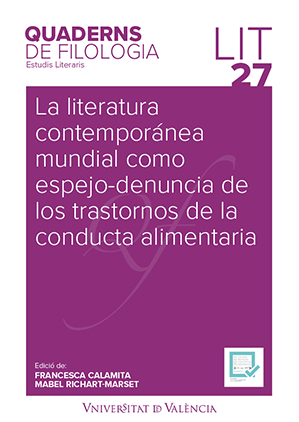On disappearance and animalization: portraits of female identity through illness and the dehumanization of the body in the novel Óxido de Carmen by Ana María del Río and Lumpérica by Diamela Eltit
DOI:
https://doi.org/10.7203/qdfed.27.25737Keywords:
identity, woman, biopolitics, disorder, feminism Abstract
Abstract
This article aims to analyze how these two works, Óxido de Carmen and Lumpérica, show the mutilating patriarchal violence over women’s bodies and psycological stability, and its policing over them through feeding behaviours and inhibiting restrictions of desire. With Ana María del Río’s novel, I will dive into the identitary comunity ties established around feeding and the identity-shattering processes narrated by te author to its extreme, through the anorexia suffered by Carmen, who ends up in a Purgatory from which the only way out is by disappearing. In Diamela’s text, I will analyze the way in which the author generates identity, a way that doesn’t involve the unavoidable destiny of a silhouette blurred to its extinction, but a deformed figure, a chosen and animalized mutation of the “female” identity. In Lumpérica, then, we face the image of marginal existence and the fight for taking space, the revelation of knowing oneself in its own terms.
 Downloads
Downloads
Downloads
Published
How to Cite
-
Abstract468
-
PDF (Español)469
Issue
Section
License
 Este obra está bajo una licencia de Creative Commons Reconocimiento-NoComercial-SinObraDerivada 4.0 Internacional.
Este obra está bajo una licencia de Creative Commons Reconocimiento-NoComercial-SinObraDerivada 4.0 Internacional.
Authors who publish with this journal agree to the following terms:
- Authors retain copyright and grant the journal right of first publication with the work simultaneously licensed under a Creative Commons Attribution License that allows others to share the work with an acknowledgement of the work's authorship and initial publication in this journal.
- Authors are able to enter into separate, additional contractual arrangements for the non-exclusive distribution of the journal's published version of the work (e.g., post it to an institutional repository or publish it in a book), with an acknowledgement of its initial publication in this journal.
- Authors are permitted and encouraged to post their work online (e.g., in institutional repositories or on their website) prior to and during the submission process, as it can lead to productive exchanges, as well as earlier and greater citation of published work (See The Effect of Open Access).




